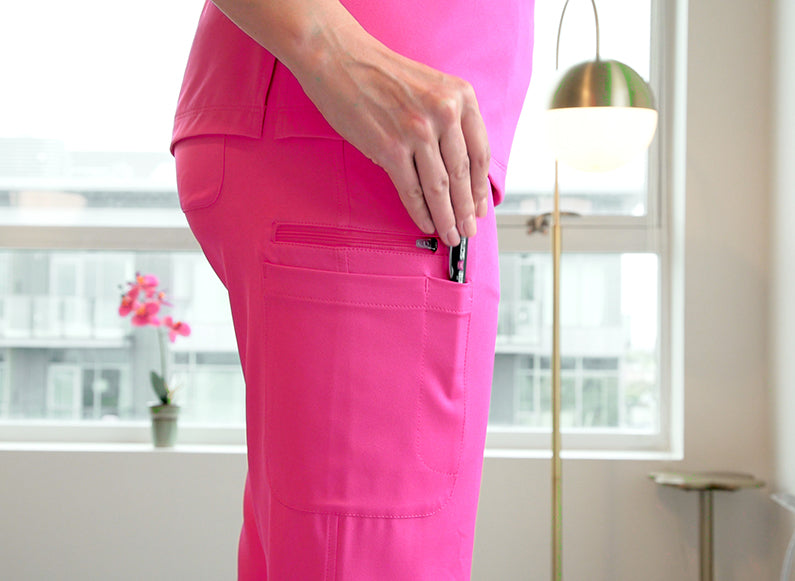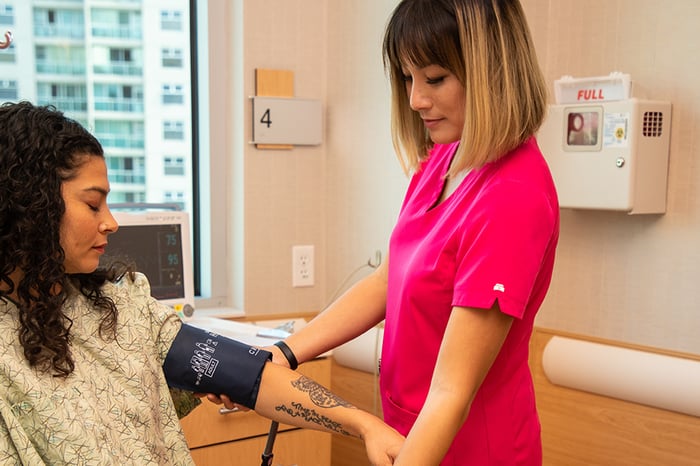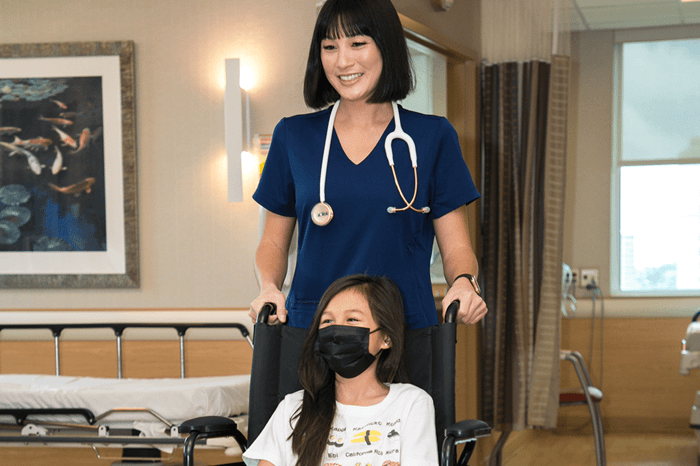A #MeetMoxieNurse Interview, as told to Heather Vaughan
Early last year, The Centers for Disease Control and Prevention (CDC) released the 2022 National Diabetes Statistics Report. This report estimates that more than 130 million adults are living with diabetes or prediabetes in the United States. With this number expected to continue climbing, the role of nurse-delivered diabetes education will become even more important for patient’s long-term success. This week, we had the chance to sit-down with Shane Hamby, RN, BSN, CDCES to discuss his experience in diabetes education as a Certified Diabetes Care and Education Specialist. Check out some of our conversation below; we hope you learn as much as we did!
Can you tell us a little about your background and how you became interested in diabetes care?
I originally got a bachelor’s degree in nutrition from New Mexico State University and worked as a nutritionist before beginning my master’s coursework and research at Brooklyn College in New York. My research was focused on studying the effects of berberine on insulin and leptin resistance, which relates directly to the pathophysiology surrounding diabetes. So, I guess you could say my interest has always been in cardiometabolic disorders, specifically diabetes.
How did you make the transition from nutrition/research into nursing?
I worked as a nutritionist for quite a while and then transitioned to working as a health coach. Soon after I began working as a health coach, I realized that I really liked working with patients, and I was good at it. Wanting a larger scope of practice, I went back to nursing school with the idea of becoming a nurse practitioner. So truly, practicing as an RN was really never the goal for me. So even while I was in nursing school, I knew that I didn't want to work as a bedside nurse. However, I wanted to at least have some kind of basis in nursing and understand what it meant to be a nurse before becoming a nurse practitioner. I wanted some experience. I worked in a few different positions as an RN before this Diabetes Nurse Educator position kind of fell into my lap.
What does your job as a Diabetes Nurse Educator entail?
The role can be complicated and go in a lot of different directions depending on the setting in which you practice. More often than not, as a diabetes educator, you have much more autonomy compared to a traditional RN position. It can involve doing diabetes education classes and individual appointments for diabetes education. Your workflow can also depend significantly on your level of autonomy within the clinic and the responsibilities provider’s delegate to you. It is possible you could be doing a lot of medication titration in addition to delivering the patient education. It can be a combination of many things. I work primarily with more complicated cases – Type 1 or very complex Type 2. Each week, I typically teach one group class where I provide basic diabetes education and self-management education. Then, throughout the week, I have a varying number of individual education/teaching appointments as well.
What does it take to be an effective Diabetes Nurse Educator?
I really believe a huge part of being a good educator is simply being able to first meet the patient where they are. If they are not ready to make any major changes, the program is going to be minimally effective - no matter what goals you have in mind. With that in mind, I strive to meet my patients wherever they are, and then it's measurable baby steps from there. Together, we just continue to set small, reasonable goals that are meaningful but also realistic.
Why do you choose to practice as a diabetes educator?
The longer I do it, the more I realize that being a diabetes educator is really the ideal position for me at this point in my life. For starters, I get to utilize my nutrition background, which has made a huge difference in my approach with some patients. But even more so, I love this job because it's meaningful. I get to see results in real time and make meaningful changes. As I mentioned before, I’m also given a lot more autonomy than most nursing roles. For instance, I utilize several standing orders where I simply make changes to medication regimens without having to get new orders from a provider. I can modify someone's correctional insulin or even manage their insulin pump. It is also nice that I have my own schedule with my own patients that come in for education appointments with me. I'm in constant dialogue with the providers, so it's really like a partnership between the provider and I; that was something I really wanted. It is also great experience for my ultimate career goal, which is to be a nurse practitioner.
What kind of certifications do you need to work in this role?
To start, you will need one of three licenses: you either need to be a registered nurse, a registered dietitian, or a clinical pharmacist. That is just to provide diabetes education. If you want to get your diabetes education program certified through the American Diabetes Education Association , then you'll need to get your CDCES, which is your Certified Diabetes Care and Education Specialist. For a diabetes education program to bill Medicare and Medicaid, the diabetes, self-management and education program must be credentialed through either the American Diabetes Association or the American Diabetes and Education Specialist Association.
In order to get the CDCES certification, you have to log at least 1000 hours of providing diabetes and self-management education. Then, you must take and pass the national certification exam, which is a four-hour, computerized test.
Patient’s often struggle with lifestyle changes, especially when first diagnosed with diabetes. Why do you think this is? Can you do anything to make this easier?
Yes, absolutely. And it can be so complicated. A new diabetes diagnosis and the associated doctors, hospitals, medications, testing, monitoring, etc. can be extremely distressing for anyone. Now, imagine trying to navigate all this as someone who maybe doesn't have very high health literacy. Suddenly, these patients are told they need to make these dramatic lifestyle changes just to maintain their health. So there is this high degree of burden just in the management piece itself; your day-in and day-out of having to make potentially life-altering decisions. You have to realize you are adding that additional stress, this additional burden.
Another aspect of patient’s resistance to change is they are often grieving for things they used to enjoy. For instance, they may go to a weekend family barbecue, and all of their friends and family are eating food you’ve enjoyed your entire life. Something as simple as this forces the patient to face the reality that they cannot eat everything they have in the past. There is a loss there, and it can be traumatic. There has been a lot of research into what’s called “diabetes distress” but it's essentially this constant cycle of grieving over the circumstances. The research has found that people with diabetes often never really make it through the stages of grief; they just kind of end up looping through them over and over. It is so very important to be aware of these internalized conflicts as a diabetes educator. Being cognizant of these emotions allows you to hold some space for your patients while not steamrolling them into the decisions you know would be most beneficial health-wise. Instead, try to provide a space where they can come to the realizations on their own.
Moxie Scrubs would like to sincerely thank Shane Hamby for his time and valuable insight into this specialized area of nursing. We appreciate all you are doing for your patients and community.
Resources:
https://www.cdc.gov/diabetes/data/statistics-report/index.html
https://www.who.int/news-room/fact-sheets/detail/diabetes
About the Author:
Ethan Perkins, MSN, AGACNP-BC, CCRN is a board-certified Adult/Gerontology Acute Care Nurse Practitioner. A Georgia native, he obtained his undergraduate degree from The University of Georgia before pursuing two graduate nursing degrees at Emory University in Atlanta. Ethan began his clinical career primarily working in pulmonology and critical care medicine. During this time, he developed a passion for patients with complex, often terminal illnesses and further focused his clinical expertise by practicing as a palliative and supportive care consultant. Ethan is an adjunct professor/lecturer at several Georgia universities and has also served in healthcare leadership and administration positions. In his free time, Ethan plays in a competitive tennis league and enjoys spending quality time with his two young daughters, Eden and Georgia.





